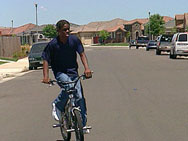Echolocation
Very interesting article from O'Brien:
Humans With Amazing Senses

Ben Underwood is blind, but he uses echo-location to ride his bike, shoot hoops and play video games. (ABC News)
Aug. 7, 2006 — When bats go out to hunt, they send out sonar signals at such high frequencies and in such rapid bursts that they can hear the signals bounce off mosquitoes in midair. They then zero in on the insects like laser-guided missiles. Dolphins use the same technique to find their dinners. It's called echolocation, a technique that uses sound to identify objects by the echoes they produce.
Fourteen-year-old Ben Underwood of Sacramento, Calif., is one of the few people known to use echolocation as a primary means of navigating the world on land. There's not even a hint of light reaching his brain. His eyes are artificial, but his brain has adapted to allow him to appraise his environment. He makes a "clicking" sound to communicate with objects and people around him.
Humans With Amazing Senses

Ben Underwood is blind, but he uses echo-location to ride his bike, shoot hoops and play video games. (ABC News)
Aug. 7, 2006 — When bats go out to hunt, they send out sonar signals at such high frequencies and in such rapid bursts that they can hear the signals bounce off mosquitoes in midair. They then zero in on the insects like laser-guided missiles. Dolphins use the same technique to find their dinners. It's called echolocation, a technique that uses sound to identify objects by the echoes they produce.
Fourteen-year-old Ben Underwood of Sacramento, Calif., is one of the few people known to use echolocation as a primary means of navigating the world on land. There's not even a hint of light reaching his brain. His eyes are artificial, but his brain has adapted to allow him to appraise his environment. He makes a "clicking" sound to communicate with objects and people around him.

